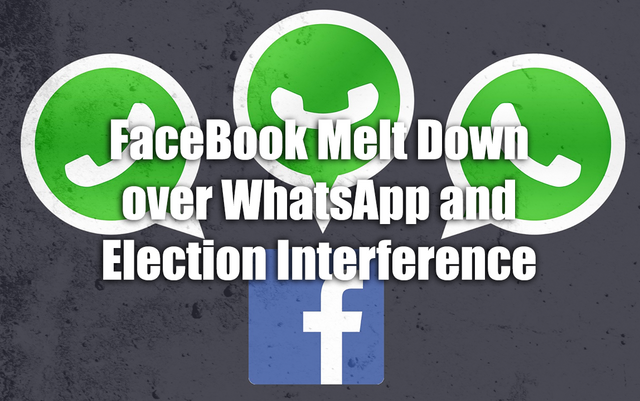FaceBook is Melting Down over WhatsApp and Election Interference | Encryption and Freedom of Speech
The FaceBook War Room Has No Control Over WhatsApp
Although FaceBook has a "War Room" dedicated to prevent "election interference," another FaceBook property, WhatsApp, which many don't even know is a FaceBook asset, has been operating outside the "War Room's" bounds.
This is not the first time WhatsApp has been at odds with it's owner, but the mechanics of WhatsApp are preventing FaceBook from monitoring and controlling any "interference."
While it’s often discussed as a chat app, WhatsApp has message-forwarding mechanics that strip away the identity of the sender and allow messages to spread virally with little accountability.
Encrypted and anonymous communication, as well as unmoderated group chats are allowing users to coordinate in WhatsApp. FaceBook is not only monitoring US election media, but the upcoming Brazilian election.
Brazilian newspaper Folha published an investigation showing that media companies are buying large groups of phone numbers and blasting them with anti-leftist propaganda on the encrypted messaging app (WhatsApp).
Folha alleges that some of these firms purchased contracts for up to 12 million reais ($3.2 million USD). Not only is this an abuse of WhatsApp, it is illegal to do this in Brazil. Companies are forbidden from donating to political campaigns, and they are not allowed to procure a candidate’s supporter database.
According to The Verge, the combination of encryption, privacy, and lack of moderation makes visibility and control impossible.
What makes the scheme insidious is that it’s not clear that any of the many screens in FaceBook’s war room are capable of capturing the activity Folha described. Misinformation is spreading virally on a platform that almost no one, FaceBook included, can see inside.
The only response to unfettered freedom is additional mechanisms of control. End to end encryption and collaboration (free association) is the enemy of authority, and authoritarians. "Solutions" to these problems are being proposed by researchers and journalists.
There are good ideas floating around for how Facebook could make life harder on WhatsApp propaganda artists. In an op-ed published in the Times this week, Brazilian researchers Cristina Tardáguila, Fabrício Benevenuto and Pablo Ortellado offered three ideas: restrict the number of times a message can be forwarded from 20 to five, which Facebook has already done in India; dramatically lower the number of people that a user can send a single message to, from its current limit of 256; and limit the size of new groups created in the weeks leading up to an election, in the hopes that it will stop new viral misinformation mobs from forming.
Casey Newton from The Verge opined:
I’ve come around to the idea that an app should be able to have end-to-end encryption, or viral sharing mechanics, but not both. If mobs are going to organize in democratic elections, it generally ought to be in plain sight, where we can see who’s holding the megaphone.
I hold the opinion that responsibility resides upon the individual, and in crypto we trust.
"If liberalism spells individualism, Fascism spells government."
-BENITO MUSSOLINI
Links: How WhatsApp is undermining Facebook’s war on election interference
-Chronic0ps
May all your ops be chronic
